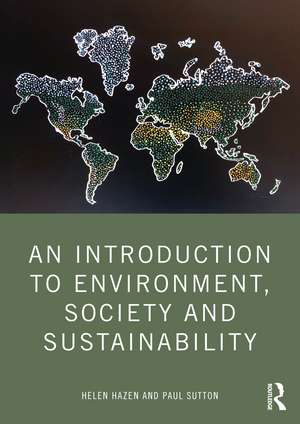An Introduction to Environment, Society and Sustainability
Autor Helen Hazen, Paul Suttonen Limba Engleză Paperback – 7 oct 2024
Adorned with illustrative figures, examples and case studies throughout, this book presents insightful analysis of ecological, economic, technological, and social justice responses to the challenges faced by human civilization, including land degradation, climate change, pollution, and overexploitation of natural resources. Many of these issues are wicked problems, characterized by incomplete information, multiple stakeholders, and contested approaches to addressing them. In simple terms, sustainability issues are an interplay between population growth and rising consumption, which are placing impossible demands on finite resources. Potential solutions to the crisis are split between green growth approaches that emphasize technology and institutional capacity to guide economic growth in more sustainable ways, and degrowth approaches that call for a fundamental rethinking of the way we structure society and generate value. This book emerged from a student seminar where undergraduate and graduate students highlighted sustainability topics of concern, helped consider their framing, and then assisted with co-writing several of the chapters. The volume encourages readers to consider structural questions that underpin sustainability dilemmas, and begins with four theoretical frameworks for understanding sustainability issues: ideas from the natural sciences, the population/consumption debate, economic frameworks, and ethical approaches. It then uses a systems approach to apply these theoretical ideas to complex global systems such as the atmosphere, oceans, and agriculture.
This volume will be of pivotal interest to students, scholars and academics in the fields of environmental studies, environment and society, human geography and environmental geography, as well as those with an interest in these areas more generally.
| Toate formatele și edițiile | Preț | Express |
|---|---|---|
| Paperback (1) | 284.49 lei 3-5 săpt. | +34.38 lei 4-10 zile |
| Taylor & Francis – 7 oct 2024 | 284.49 lei 3-5 săpt. | +34.38 lei 4-10 zile |
| Hardback (1) | 771.63 lei 6-8 săpt. | |
| Taylor & Francis – 7 oct 2024 | 771.63 lei 6-8 săpt. |
Preț: 284.49 lei
Nou
Puncte Express: 427
Preț estimativ în valută:
54.44€ • 56.63$ • 44.95£
54.44€ • 56.63$ • 44.95£
Carte disponibilă
Livrare economică 25 martie-08 aprilie
Livrare express 08-14 martie pentru 44.37 lei
Preluare comenzi: 021 569.72.76
Specificații
ISBN-13: 9781032265032
ISBN-10: 1032265035
Pagini: 382
Ilustrații: 312
Dimensiuni: 174 x 246 x 21 mm
Greutate: 0.76 kg
Ediția:1
Editura: Taylor & Francis
Colecția Routledge
Locul publicării:Oxford, United Kingdom
ISBN-10: 1032265035
Pagini: 382
Ilustrații: 312
Dimensiuni: 174 x 246 x 21 mm
Greutate: 0.76 kg
Ediția:1
Editura: Taylor & Francis
Colecția Routledge
Locul publicării:Oxford, United Kingdom
Public țintă
Undergraduate Advanced and Undergraduate CoreCuprins
'1. Introduction to Sustainability and the Human-Environment System. 2. Biophysical Perspectives on Sustainability. 3. Population and Consumption. 4. Economic Perspectives on Sustainability. 5. Ethical Approaches to Sustainability. 6. Earth's Atmosphere. 7. Oceans. 8. Fresh Water. 9. Wildlands. 10. Agriculture. 11. Urban Systems. 12. Conclusion.
Notă biografică
Helen Hazen is a teaching professor at the University of Denver. After completing an undergraduate degree in geography at Oxford University, she worked in the field of environmental conservation before earning a Ph.D. in geography from the University of Minnesota. Dr. Hazen has published on a variety of aspects of human-environment interactions, including the role of the World Heritage Program in environmental protection and biases in ecosystem protection. Her teaching interests focus on health, environment, and sustainability and have led to the publication of undergraduate textbooks in health geography and population geography.
Paul Sutton is a professor in the Department of Geography and the Environment at the University of Denver. Dr. Sutton is also a member of the board of trustees for the small town of Morrison, CO (pop ~350). He also serves on the board of the Denver Regional Council of Governments. Dr. Sutton obtained his B.S. from Union College in Chemistry, his M.A. in Statistics and PhD in Geography from UCSB. His research interests are in the general area of human-environment relations with a particular interest in population geography, sustainability science, and ecological economics.
Paul Sutton is a professor in the Department of Geography and the Environment at the University of Denver. Dr. Sutton is also a member of the board of trustees for the small town of Morrison, CO (pop ~350). He also serves on the board of the Denver Regional Council of Governments. Dr. Sutton obtained his B.S. from Union College in Chemistry, his M.A. in Statistics and PhD in Geography from UCSB. His research interests are in the general area of human-environment relations with a particular interest in population geography, sustainability science, and ecological economics.
Descriere
This timely and innovative book delves into the complex interplay of human activities and natural limits in generating today’s sustainability challenges. The volume navigates the contested terrain where human societies generate environmental impacts.
